- Home
- Bill Bryson
A Walk in the Woods Page 3
A Walk in the Woods Read online
Page 3
“Oh, great,” he said in a flood of relief, then added in a confessional tone, “I thought maybe you might not want me along.”
“Why ever not?”
“Because, you know, I still owe you $600 from Europe.”
“Hey, jeez, certainly not…. You owe me $600?”
“I still intend to pay you back.”
“Hey,” I said. “Hey.” I couldn’t remember any $600. I had never released anyone from a debt of this magnitude before, and it took me a moment to get the words out. “Listen, it’s not a problem. Just come hiking with me. Are you sure you’re up for this?”
“Absolutely.”
“What kind of shape are you in?”
“Real good. I walk everywhere these days.”
“Really?” This is most unusual in America.
“Well, they repossessed my car, you see.”
“Ah.”
We talked a little more about this and that — his mother, my mother, Des Moines. I told him what little I knew about the trail and the wilderness life that awaited us. We settled that he would fly to New Hampshire the next Wednesday, we would spend two days making preparations, and then we’d hit the trail. For the first time in months I felt positively positive about this enterprise. Katz seemed remarkably upbeat, too, for someone who didn’t have to do this at all.
My last words to him were, “So, how are you with bears?”
“Hey, they haven’t got me yet!”
That’s the spirit, I thought. Good old Katz. Good old anyone with a pulse and a willingness to go walking with me. After he hung up, it occurred to me I hadn’t asked him why he wanted to come. Katz was the one person I knew on earth who might be on the run from guys with names like Julio and Mr. Big. Anyway, I didn’t care. I wasn’t going to have to walk alone.
I found my wife at the kitchen sink and told her the good news. She was more reserved in her enthusiasm than I had hoped.
“You’re going into the woods for weeks and weeks with a person you have barely seen for twenty-five years. Have you really thought this through?” (As if I have ever thought anything through.) “I thought you two ended up getting on each other’s nerves in Europe.”
“No.” This was not quite correct. “We started off on each other’s nerves. We ended up despising each other. But that was a long time ago.”
She gave me a look of some dubiety. “You have nothing in common.”
“We have everything in common. We’re forty-four years old. We’ll talk about hemorrhoids and lower back pain and how we can’t remember where we put anything, and the next night I’ll say, ‘Hey, did I tell you about my back problems?’ and he’ll say, ‘No, I don’t think so,’ and we’ll do it all over again. It’ll be great.”
“It’ll be hell.”
“Yeah, I know,” I said.
And so I found myself, six days later, standing at our local airport watching a tin commuter plane containing Katz touch down and taxi to a halt on the tarmac twenty yards from the terminal. The hum of the propellers intensified for a moment then gradually stuttered to a halt, and the plane’s door-cum-stairway fell open. I tried to remember the last time I had seen him. After our summer in Europe, Katz had gone back to Des Moines and had become, in effect, Iowa’s drug culture. He had partied for years, until there was no one left to party with, then he had partied with himself, alone in small apartments, in T-shirt and boxer shorts, with a bottle and a Baggie of pot and a TV with rabbit ears. I remembered now that the last time I had seen him was about five years earlier in a Denny’s restaurant where I was taking my mother for breakfast. He was sitting in a booth with a haggard fellow who looked like his name would be Virgil Starkweather, tucking into pancakes and taking occasional illicit nips from a bottle in a paper bag. It was eight in the morning and Katz looked very happy. He was always happy when he was drunk, and he was always drunk.
Two weeks after that, I later heard, police found him in an upended car in a field outside the little town of Mingo, hanging upside down by his seatbelt, still clutching the steering wheel and saying, “Well, what seems to be the problem, officers?” There was a small quantity of cocaine in the glove box and he was dispatched to a minimum security prison for eighteen months. While there, he started attending AA meetings. To everyone’s surprise, not least his own, he had not touched alcohol or an illegal substance since.
After his release, he got a little job, went back to college part-time, and settled down for a while with a hairdresser named Patty. For the past three years he had devoted himself to rectitude and — I instantly saw now as he stooped out the door of the plane — growing a stomach. Katz was arrestingly larger than when I had last seen him. He had always been kind of fleshy, but now he brought to mind Orson Welles after a very bad night. He was limping a little and breathing harder than one ought to after a walk of twenty yards.
“Man, I’m hungry,” he said without preamble, and let me take his carry-on bag, which instantly jerked my arm to the floor.
“What have you got in here?” I gasped.
“Ah, just some tapes and shit for the trail. There a Dunkin Donuts anywhere around here? I haven’t had anything to eat since Boston.”
“Boston? You’ve just come from Boston.”
“Yeah, I gotta eat something every hour or so or I have, whad-dayacallit, seizures.”
“Seizures?” This wasn’t quite the reunion scenario I had envisioned. I imagined him bouncing around on the Appalachian Trail like some wind-up toy that had fallen on its back.
“Ever since I took some contaminated phenylthiamines about ten years ago. If I eat a couple of doughnuts or something I’m usually OK.”
“Stephen, we’re going to be in the wilderness in three days. There won’t be doughnut stores.”
He beamed proudly. “I thought of that.” He indicated his bag on the carousel — a green army surplus duffel — and let me pick it up. It weighed at least seventy-five pounds. He saw my look of wonder. “Snickers,” he explained. “Lots and lots of Snickers.”
We drove home by way of Dunkin Donuts. My wife and I sat with him at the kitchen table and watched him eat five Boston cream doughnuts, which he washed down with two glasses of milk. Then he said he wanted to go and lie down a while. It took him whole minutes to get up the stairs.
My wife turned to me with a look of serene blankness.
“Please just don’t say anything,” I said.
In the afternoon, after Katz had rested, he and I visited Dave Mengle and got him fitted with a backpack and a tent and sleeping bag and all the rest of it, and then went to Kmart for a groundsheet and thermal underwear and some other small things. After that he rested some more.
The following day, we went to the supermarket to buy provisions for our first week on the trail. I knew nothing about cooking, but Katz had been looking after himself for years and had a repertoire of dishes (principally involving peanut butter, tuna, and brown sugar stirred together in a pot) that he thought would transfer nicely to a camping milieu, but he also piled lots of other things into the shopping cart — four large pepperoni sausages, five pounds of rice, assorted bags of cookies, oatmeal, raisins, M&Ms, Spam, more Snickers, sunflower seeds, graham crackers, instant mashed potatoes, several sticks of beef jerky, a couple of bricks of cheese, a canned ham, and the full range of gooey and evidently imperishable cakes and doughnuts produced under the Little Debbie label.
“You know, I don’t think we’ll be able to carry all this,” I suggested uneasily as he placed a horse-collar-shaped bologna in the shopping cart.
Katz surveyed the cart grimly. “Yeah, you’re right,” he agreed. “Let’s start again.”
He abandoned the cart there and went off for another one. We went around again, this time trying to be more intelligently selective, but we still ended up with clearly too much.
We took everything home, divvied it up, and went off to pack — Katz to the bedroom where all his other stuff was, I to my basement HQ. I packed for two hours, but I
couldn’t begin to get everything in. I put aside books and notebooks and nearly all my spare clothes, and tried lots of different combinations, but every time I finished I would turn to find something large and important left over. Eventually I went upstairs to see how Katz was doing. He was lying on the bed, listening to his Walkman. Stuff was scattered everywhere. His backpack was limp and unattended. Little percussive hisses of music were leaking from his ears.
“Aren’t you packing?” I said.
“Yeah.”
I waited a minute, thinking he would bound up, but he didn’t move. “Forgive me, Stephen, but you give the impression that you are lying down.”
“Yeah.”
“Can you actually hear what I’m saying?”
“Yeah, in a minute.”
I sighed and went back down to the basement.
Katz said little during dinner and afterwards returned to his room. We heard nothing more from him throughout the evening, but about midnight, as we lay in bed, noises began to float to us through the walls — clompings and mutterings, sounds like furniture being dragged across the floor, and brief enraged outbursts, interspersed with long periods of silence. I held my wife’s hand and couldn’t think of anything to say. In the morning, I tapped on Katz’s door and eventually put my head in. He was asleep, fully dressed, on top of a tumult of bedding. The mattress was part way off the bed, as if he had been engaged in the night in some scuffle with intruders. His pack was full but unsecured, and personal effects were still liberally distributed around the room. I told him we had to leave in an hour to catch our plane.
“Yeah,” he said.
Twenty minutes later, he came downstairs, laboriously and with a great deal of soft cursing. Without even looking, you could tell he was coming down sideways and with care, as if the steps were glazed with ice. He was wearing his pack. Things were tied to it all over — a pair of grubby sneakers and what looked like a pair of dress boots, his pots and pans, a Laura Ashley shopping bag evidently appropriated from my wife’s wardrobe and filled now with God knows what. “This is the best I could do,” he said. “I had to leave a few things.”
I nodded. I’d left a few things, too — notably, the oatmeal, which I didn’t like anyway, and the more disgusting looking of the Little Debbie cakes, which is to say all of them.
My wife drove us to the airport in Manchester, through blowing snow, in the kind of awkward silence that precedes a long separation. Katz sat in back and ate doughnuts. At the airport, she presented me with a knobbly walking stick the children had bought me. It had a red bow on it. I wanted to burst into tears — or, better still, climb in the car and speed off while Katz was still frowning over his new, unfamiliar straps. She squeezed my arm, gave a weak smile, and left.
I watched her go, then went into the terminal with Katz. The man at the check-in desk looked at our tickets to Atlanta and our packs and said — quite alertly, I thought, for a person wearing a shortsleeve shirt in winter — “You fellows hiking the Appalachian Trail?”
“Sure are,” said Katz proudly.
“Lot of trouble with wolves down in Georgia, you know.”
“Really?” Katz was all ears.
“Oh, yeah. Coupla people been attacked recently. Pretty savagely, too, from what I hear.” He messed around with tickets and luggage tags for a minute. “Hope you brought some long underwear.”
Katz screwed up his face. “For wolves?”
“No, for the weather. There’s gonna be record cold down there over the next four or five days. Gonna be well below zero in Atlanta tonight.”
“Oh, great,” Katz said and gave a ruptured, disconsolate sigh. He looked challengingly at the man. “Any other news for us? Hospital call to say we got cancer or anything?”
The man beamed and slapped the tickets down on the counter. “No, that’s about it, but you have a real good trip. And hey” — he was addressing Katz now, in a lower voice — “you watch out for those wolves, son, because between you and me you look like pretty good eating.” He gave a wink.
“Jesus,” said Katz in a low voice, and he looked deeply, deeply gloomy.
We took the escalator up to our gate. “And they won’t feed us on this plane either, you know,” he announced with a curious, bitter finality.
Chapter 3
It started with Benton MacKaye, a mild, kindly, infinitely well-meaning visionary who in the summer of 1921 unveiled an ambitious plan for a long-distance hiking trail to his friend Charles Harris Whitaker, editor of a leading architectural journal. To say that MacKaye’s life at this point was not going well would be to engage in careless understatement. In the previous decade he had been let go from jobs at Harvard and the National Forest Service and eventually, for want of a better place to stick him, given a desk at the U.S. Labor Department with a vague assignment to come up with ideas to improve efficiency and morale. There, he dutifully produced ambitious, unworkable proposals that were read with amused tolerance and promptly binned. In April 1921 his wife, a well-known pacifist and suffragette named Jessie Hardy Stubbs, flung herself off a bridge over the East River in New York and drowned.
It was against this background, just ten weeks later, that MacKaye offered Whitaker his idea for an Appalachian Trail, and the proposal was published in the somewhat unlikely forum of Whitaker’s Journal of the American Institute of Architects the following October. A hiking trail was only part of MacKaye’s grand vision. He saw the AT as a thread connecting a network of mountaintop work camps where pale, depleted urban workers in the thousands would come and engage in healthful toil in a selfless spirit and refresh themselves on nature. There were to be hostels and inns and seasonal study centers, and eventually permanent woodland villages — “self-owning” communities whose inhabitants would support themselves with cooperative “non-industrial activity” based on forestry, farming, and crafts. The whole would be, as MacKaye ecstatically described it, “a retreat from profit” — a notion that others saw as “smacking of Bolshevism,” in the words of one biographer.
At the time of MacKaye’s proposal there were already several hiking clubs in the eastern United States — the Green Mountain Club, the Dartmouth Outing Club, the venerable Appalachian Mountain Club, among others — and these mostly patrician organizations owned and maintained hundreds of miles of mountain and woodland trails, mainly in New England. In 1925, representatives of the leading clubs met in Washington and founded the Appalachian Trail Conference with a view to constructing a 1,200-mile-long trail connecting the two highest peaks in the east: 6,684-foot Mount Mitchell in North Carolina and the slightly smaller (by 396 feet) Mount Washington in New Hampshire. In fact, however, for the next five years nothing happened, largely because MacKaye occupied himself with refining and expanding his vision until he and it were only tangentially connected to the real world.
Not until 1930, when a young Washington admiralty lawyer and keen hiker named Myron Avery took over the development of the project, did work actually begin, but suddenly it moved on apace. Avery was not evidently a lovable fellow. As one contemporary put it, he left two trails from Maine to Georgia: “One was of hurt feelings and bruised egos. The other was the AT.” He had no patience with MacKaye and his “quasi-mystical epigrams,” and the two never got along. In 1935, they had an acrimonious falling-out over the development of the trail through Shenandoah National Park (Avery was willing to accommodate the building of a scenic highway through the mountains; MacKaye thought it a betrayal of founding principles) and they never spoke again.
MacKaye always gets the credit for the trail, but this is largely because he lived to be ninety-six and had a good head of white hair; he was always available in his later years to say a few words at ceremonies on sunny hillsides. Avery, on the other hand, died in 1952, a quarter-century before MacKaye and when the trail was still little known. But it was really Avery’s trail. He mapped it out, bullied and cajoled clubs into producing volunteer crews, and personally superintended the construction of hundreds of mil
es of path. He extended its planned length from 1,200 miles to well over 2,000, and before it was finished he had walked every inch of it. In under seven years, using volunteer labor, he built a 2,000-mile trail through mountain wilderness. Armies have done less.
The Appalachian Trail was formally completed on August 14, 1937, with the clearing of a two-mile stretch of woods in a remote part of Maine. Remarkably, the building of the longest footpath in the world attracted almost no attention. Avery was not one for publicity, and by this time MacKaye had retired in a funk. No newspapers noted the achievement. There was no formal celebration to mark the occasion.
The path they built had no historical basis. It didn’t follow any Indian trails or colonial post roads. It didn’t even seek out the best views, highest hills, or most notable landmarks. In the end, it went nowhere near Mount Mitchell, though it did take in Mount Washington and then carried on another 350 miles to Mount Katahdin in Maine. (Avery, who had grown up in Maine and done his formative hiking there, was most insistent on this.) Essentially, it went where access could be gained, mostly high up on the hills, over lonely ridges and forgotten hollows that no one had ever used or coveted, or sometimes even named. It fell short of the actual southern end of the Appalachian Mountain chain by 150 miles and of the northern end by nearer 700. The work camps and chalets, the schools and study centers, were never built.
Still, quite a lot of the original impulse behind MacKaye’s vision survives. All 2,100 miles of the trail, as well as side trails, footbridges, signs, blazes, and shelters, are maintained by volunteers — indeed, the AT is said to be the largest volunteer-run undertaking on the planet. It remains gloriously free of commercialism. The Appalachian Trail Conference didn’t hire its first paid employee until 1968, and it retains the air of a friendly, accessible, dedicated outfit. The AT is no longer the longest hiking trail — the Pacific Crest and Continental Divide trails, both out West, are slightly longer — but it will always be the first and greatest. It has a lot of friends. It deserves them.

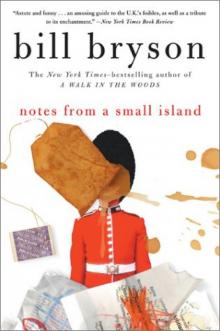 Notes from a Small Island
Notes from a Small Island A Short History of Nearly Everything
A Short History of Nearly Everything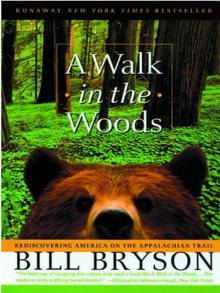 A Walk in the Woods
A Walk in the Woods I'm a Stranger Here Myself
I'm a Stranger Here Myself The Mother Tongue
The Mother Tongue Shakespeare
Shakespeare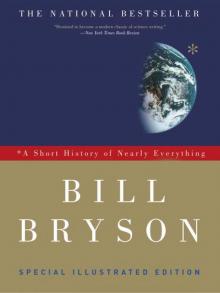 A Short History of Nearly Everything: Special Illustrated Edition
A Short History of Nearly Everything: Special Illustrated Edition The Best American Travel Writing 2016
The Best American Travel Writing 2016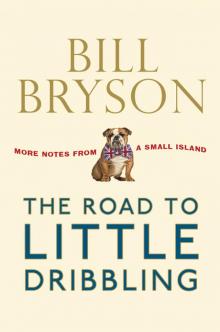 The Road to Little Dribbling
The Road to Little Dribbling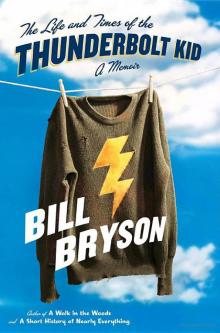 The Life And Times Of The Thunderbolt Kid: A Memoir (v5.0)
The Life And Times Of The Thunderbolt Kid: A Memoir (v5.0) Made In America
Made In America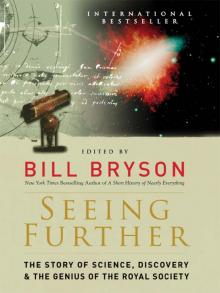 Seeing Further
Seeing Further Shakespeare: The World as Stage
Shakespeare: The World as Stage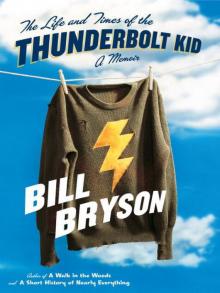 The Life and Times of the Thunderbolt Kid
The Life and Times of the Thunderbolt Kid At Home
At Home Bryson's Dictionary For Writers And Editors (v5.0)
Bryson's Dictionary For Writers And Editors (v5.0) Neither Here Nor There
Neither Here Nor There Bill Bryson's African Diary
Bill Bryson's African Diary